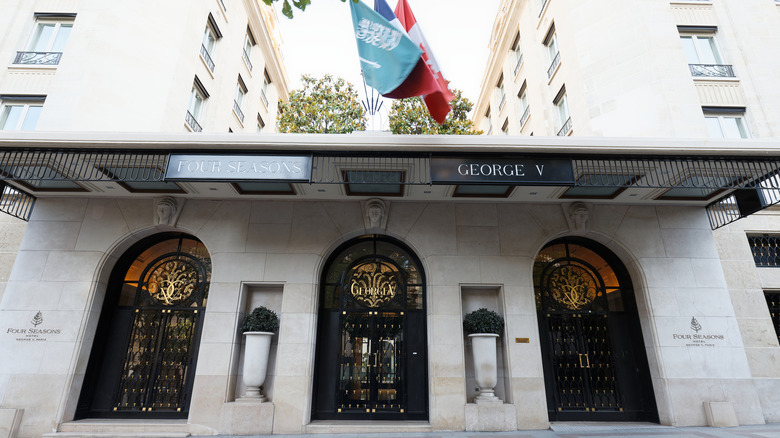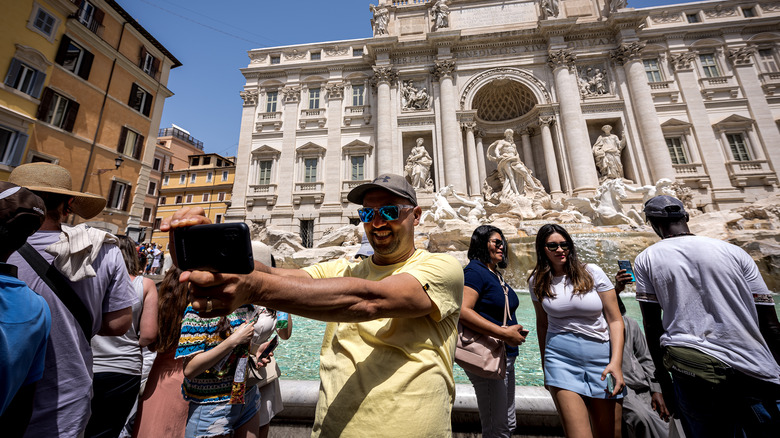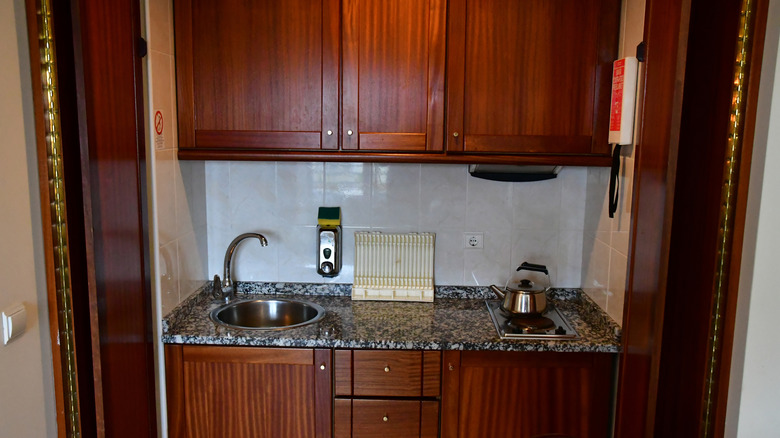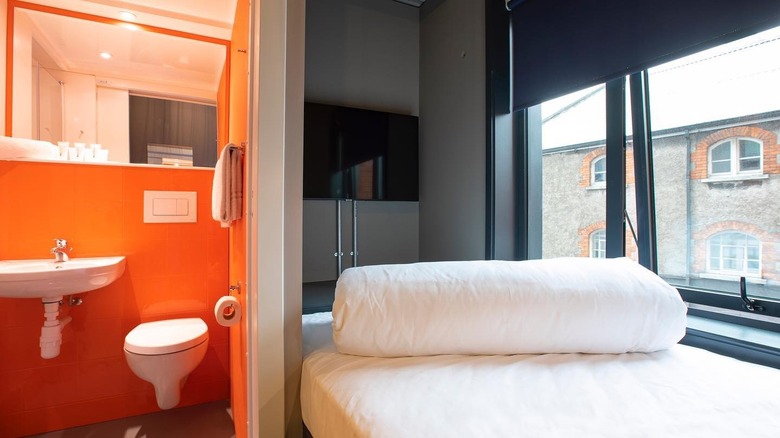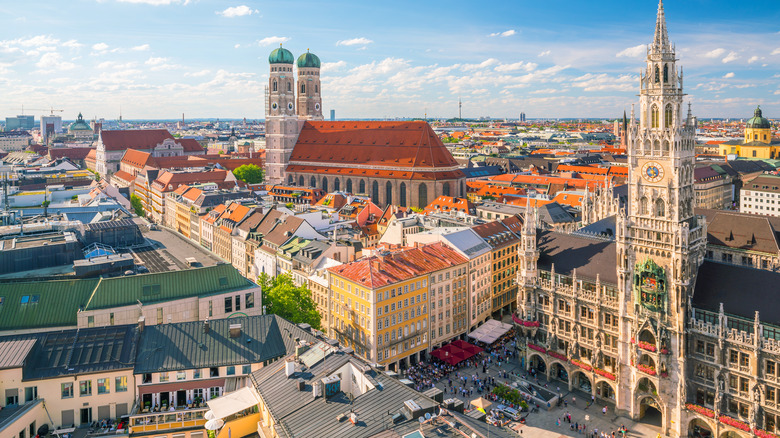Genius Money-Saving Tips For Booking Hotels In Europe
Even well-traveled folks know that there are no guarantees when paying for travel. Still, you can always try some tried and true methods to save money. Hotels are one of the most expensive parts of traveling, so anything you can do to reduce the bill by the end of your adventure can help in the long run. Even if it means making your own food in your hotel room, every dollar saved could come in handy later.
There are many universal ways to save money, like avoiding certain holidays, not traveling in the summer season, or avoiding over-touristed areas. Plus, if you visit certain places in the off-season, you'll get a whole new perspective of that location you may not otherwise get. Or just survive a week in Greece because it isn't 100+ degrees. Yet there are plenty of Europe-centered ways to save money on your next trip. Here are some of the easiest ways to save big on your next European holiday.
Don't assume star ratings indicate quality
Regarding star rating systems for hotels, only some scales are treated equally. Each country defines a four- or five-star hotel experience, which may or may not meet your expectations as a traveler. For the most part, a lot of European hotels get star ratings based on the number of amenities they offer. While more amenities like air conditioning or elevators will make your stay nicer, that doesn't necessarily mean it is five-star hotel quality, per your understanding.
For example, a three-star hotel in Paris is considered the middle of the road for accommodations. It will be comfortable and relatively affordable. Air conditioning isn't required at this star level, though many Parisian hotels have them to stay competitive with one another.
Meanwhile, a five-star hotel in Paris is nearly an impossible feat. Less than a dozen hotels have that designation in the whole city. A five-star hotel in Paris means the highest quality you can expect. So know the place you're booking before adhering to a star level for hotel booking.
Have date flexibility
This isn't just a way to save money on hotels in Europe; being flexible in your vacation days is also an excellent way to save money on flights and other transportation. If you can compare different sets of dates, there's a good chance you'll score a better deal on your nightly rate than if you have dates set in stone from the get-go.
Another perk to flexibility is that you might be able to avoid holidays celebrated in Europe when places tend to be more expensive and crowded. Some of the holidays you might not be aware of include St. John's Day on June 24 for much of Northern Europe, King's Day in the Netherlands on April 27, or Bastille Day in France on July 14. If you are rigid in your travel plans, you might have to pay much more for holiday hotel dates, so watch out.
Know the travel seasons in your destination
If there is a golden rule to saving money, it's this: Always travel in the off-season. Unless there is a specific reason you need to be in Rome at the height of summer or can't fathom missing a springtime in Paris, going somewhere when there are fewer tourists is a guaranteed way to pay less all around — not just on the hotel.
As a general rule of thumb, it's better to avoid European travel from December to March if you want to save money. The colder weather keeps some folks away, while the plethora of holiday markets brings throngs of other kinds of tourists to much of the continent. What you want to do is aim to travel during the shoulder or off-season. For Europe as a whole, these times are April through mid-June and September through October. Weather during these periods tends to be milder, prices are lower, and the crowds are much more manageable than other times of the year.
Snag accommodation with a kitchen
While this may not save you money at the front desk of your hotel, it will save you money on the trip in general. If you can get a hotel or other accommodation with a kitchen, you can spend less money on takeout or eating at the various cafes. You'll save money at the hotel if you aren't buying breakfast or dinner every day there.
You shouldn't even assume that your European hotel will have a coffee maker. If it doesn't, it may be possible to borrow one from the front desk. This is a perk some hotels offer, though there's a good chance you just won't have one. You may have an electric kettle in your room, though you'll need either instant coffee or a pour-over setup to make coffee that way. Even being able to make coffee in your hotel room will save you a few dollars or euros a day and that adds up quickly.
Don't ignore hostels
Okay, we get it: Hostels have a reputation. Just because popular culture leads travelers to believe that all hostels are dingy doesn't mean they are. These cheap, sometimes shared accommodation spaces come in various types. Private rooms can be just as nice as a traditional hotel room, even if they're slightly pared down.
You can also assume that hotels that may not call themselves hostels may be hostel-style, especially if they are rated one or two stars. Many European countries require three-star hotels to have private en-suite bathrooms. So keep that in mind while booking hotels.
Besides offering cheaper but still cozy accommodation options, many European hostels have excellent perks. These may include free laundry, free breakfast, access to kitchens, lounges with games and books to borrow, and even free activities. Since European hostels cater largely to younger travelers, particularly those backpacking, they sweeten the deal with many excellent perks. These amenities alone can make a hostel stay worth much more than the cash you'll save by staying there.
Keep an eye out for micro hotels
Not to be confused with hostels, some of the cheapest hotels you'll find in Europe are micro hotels. These accommodations come with everything you'd expect from a traditional hotel room on a more fundamental scale. For example, your room may be about the size of a dorm room with just enough space for a bed, shelving, and a bathroom. If you don't need anything more than a place to shower and sleep, these rooms are a terrific way to save money in Europe.
As we mentioned earlier, hotels with stars of at least three generally require private en-suite bathrooms. Many of the micro hotels in Europe fall under this category. But at the same time, they have some of the same amenities that hostels offer.
For example, a place like REZz in Ireland is a two-star micro hotel. Still, the rooms are comfy and have private bathrooms. It is definitely a step up from a lot of the hostels. Plus REZz locations have shared kitchen areas with coffeemakers and kettles, laundry facilities, and even a bar on-site.
Consider location and access
For traveling to metropolitan areas in Europe, the prices of hotels outside the city center should be cheaper. Sometimes that's a great option, especially if you're comfortable with public transit, though that isn't the choice for everyone. If you aren't up for navigating a lot of transit, try to find a hotel that can save you money within walking distance of shops or other things you might need, like a restaurant or grocery store.
One perk to staying in a more populated area of a European city means you're probably closer to many things. That walkability will save you a lot of money just in missed cab fare or transit fees alone. Even if it is nominally more expensive to stay closer to a city center, consider the unseen costs of staying outside it. It's like figuring out if it's worth flying in and out of the Charles de Gaulle Airport when visiting Paris without considering how long it takes to get there from the city. It's usually not worth it.
Always book direct
Third-party travel sites like Booking or Expedia might save you money when booking a hotel. However, the prices are likely just as reasonable on the hotel website. Even if the prices aren't identical, booking directly offers the chance that you'll be upgraded by the front desk or receive perks like complimentary breakfast that you may not if you book elsewhere.
More importantly, if you book direct, you don't have to deal with the time difference barriers between getting ahold of a third-party company from Europe. If something goes awry at your hotel or rental car company and you've booked directly, it will be much easier for you to get the issue sorted out in real time if you aren't battling a time difference in the process.
Also, booking through third-party sites usually means the location you're booking can't help you with issues directly. You're stuck waiting on the third-party company to help you out. Once again, saving that money isn't worth the time and effort of trying to sort out potential trip issues.

